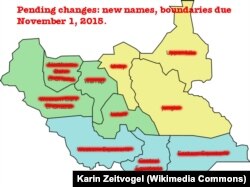South Sudanese President Salva Kiir says he will repartition the country into 28 states, up from the current 10. Opponents say taking such unilateral action is a violation of the recently signed peace deal, and is the latest sticking point on the path to peace.
Kiir says splitting South Sudan into 28 states will help reduce the size of the national government and distribute more resources to the rural population.
But rebel leader and ousted vicepresident Riek Machar says the president should have consulted the opposition first, per the terms of a peace agreement signed in August to end nearly two years of fighting.
Machar spoke Wednesday with VOA’s "Straight Talk Africa" host Shaka Sali.
“We ourselves in the SPLM/SPLA declared 21 states, and we tabled this at the negotiations. We wanted to resolve this matter once and for all, but he was not ready. [Shaka Sali asks: He rejected it?] He rejected it. Even the mediators were on his side. They rejected it. Now we are surprised. Five days ago, he made this declaration,” said Machar.
The European Union delegation to South Sudan and the "Troika" countries of Norway, the United Kingdom, and the United States are urging Kiir to wait for a permanent constitution before constructing new states.
But Zacharia Diing, senior policy analyst with the Sudd Institute in Juba, said Kiir doesn't have to wait.
“You have the government of the Republic of South Sudan, which has a president and the party that is in power right now, that can make decisions on the country. Until the transitional government is in place, I think it is far-fetched to say that there was a need on the part of the president to consult Mr. Machar at this point,” said Diing.
Vukasin Petrovic, the head of Africa programs at Freedom House, believes this current point of contention is just a distraction.
"And I would say, at any different point, in the future, the decentralization would make sense for South Sudan and splitting the country into more manageable units, would make sense. At this stage, it absolutely does not … both parties in South Sudan conflict are just looking for reasons not to achieve peace deal,” said Petrovic.
A transitional government is due to be set up as early as November, according to the terms of the peace deal.
South Sudan gained independence from Sudan in 2011 after decades of civil war. War erupted anew in December 2013, however, after Kiir’s dismissal of his then-deputy Machar.
According to the Council on Foreign Relations, the conflict has killed tens of thousands of people and internally displaced more than 1.6 million.
Clashes have continued despite the August peace deal, with both sides accusing the other of violating the cease-fire.





